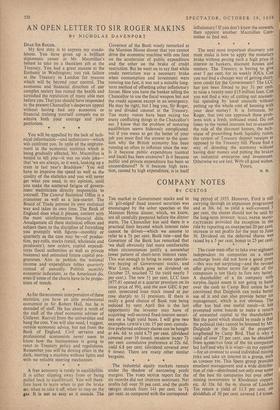COMPANY NOTES
BY CUSTOS THE market in Government stocks and in all 'gilt-edged' fixed interest securities was encouraged by the sober speeches at the Mansion House dinner, which, we know, are all carefully prepared before the dinner starts. The Chancellor has said there is a practical limit beyond which interest rates cannot be driven—which we assume to refer to a 51 per cent. Bank rate—and the Governor of the Bank has remarked that 'we shall obviously feel more comfortable when circumstances justify a somewhat lower pattern of short-term interest rates.' This was enough to bring in some specula-, tive buying of Government stocks, and War Loan, which goes ex dividend on October 25, touched 72 (to yield nearly 5 per cent.). The new 51 per cent. LCC loan 1977-81 opened at a quarter premium on its issue pripe of 991, and the new GEC 6 per cent. unsecured loan stock issued at par rose sharply to 11 premium. If there is really a good chance of Bank rate being reduced by next April this is the, last opportunity the investor may have of acquiring well-secured fixed-interest securi- ties on a high yield basis. I will give two examples. LEWIS'S LTD. 15 per cent. cumula- tive preferred ordinary shares can be bought at 44s. 6d. to yield 6.75 per cent. (dividend covered over 10 times). MEADOW DAIRY 74 per cent. cumulative preference at 22s. 6d. yield 6.8 per cent. (dividend covered over 9 times). There are many other similar bargains.
The industrial equity markets remain under the shadow of narrowing profit margins. The FORD MOTOR report for the six months did not improve sentiment. Net profits fell over 50 pey cent. and the profit margin shrank from 141 per cent. to 74 per cent. as compared with the correspond- ing period of 1955, However, Ford is still carrying through its expansion programme and at 30s. 6d. to yield a well-covered 5 per cent. the shares should not be sold by the long-term investor. WALL PAPER MANU- FACTURERS provided the exception to the rule by reporting an unexpected 20 per cent. increase in net profits for the year to June 30. Dividend on the deferred shares was raised by a 5 per cent. bonus to 25 per cent.
* * *
The CAMP BIRD offer to take over eighteen independent tin companies on a share exchange basis did not have a good press — this was not surprising—and the revised offer giving better terms for eight of the companies is not likely to fare any better. A shareholder of a tin company with surplus liquid assets is' not going to hand over the cash to Camp Bird unless he Is convinced that Dalgleish can make better use of it and can also provide better tin management, which is not obvious. The offer has had one useful result—it has prompted some, boards to make a return of unwanted capital to the shareholders. But the point which should be made is that the political risks cannot be lessened by Mr. Dalgleish or the life of the propertY lengthened by Camp Bird. That is why a yield of over 25 per cent. can be obtained from RAMBUTAN (one of the tin companies bid for) and why it is wiser—in my opinion — for an investor to avoid individual mining risks and take an interest in a group, such as LONDON TIN. This Spens group provides excellent management and a wide distribu- tion of risk—distributed not only over some of the best tin companies but over other mining investments in Rhodesian copper, etc. At 10s. 6d. the 4s. shares of London Tin return a yield of 11.3 pdr cent. on dividdnds of 30 per cent. covered 1.4 times.


































 Previous page
Previous page